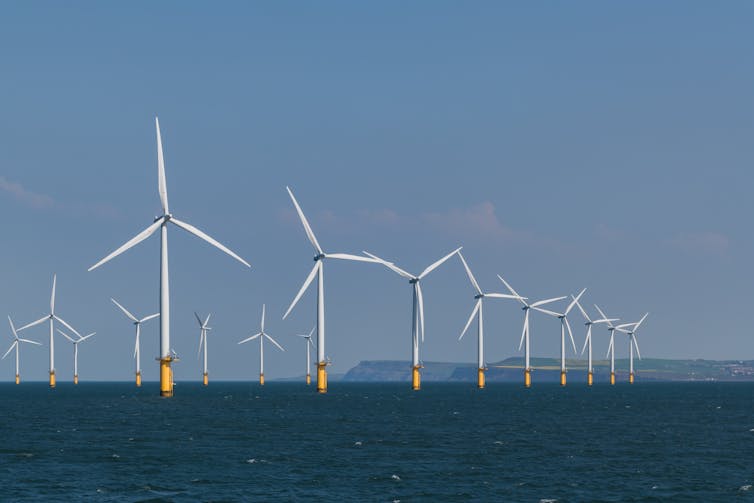Brexit Britain has taken its eye off the Paris Agreement on climate change

Mark Burrows (Nottingham, UK) / shutterstock
Ashley Murphy, Keele University
When Theresa May became the “Brexit prime minister” in July 2016 it took her less than 24 hours to dissolve the Department of Energy and Climate Change. The message could not have been clearer: Brexit first, and climate change would have to wait.
May, although historically noncommittal on the subject of climate regulation, was probably not acting on a disbelief in the threat of climate change. The far more concerning motivation was the simple preoccupation with another political concern.
Throughout May’s tenure it has become all too clear that the UK government is fixated on Brexit, along with the country’s media and almost everybody else. Climate change has been continually pushed out of the headlines by yet another Brexit blooper, which has serious implications for the UK’s international policy.
The Paris Agreement intends to keep global temperature increases at below 2℃ above pre-industrial levels. It is premised on the notion that states set their own nationally determined contributions (NDCs), essentially setting out how much carbon they themselves will cut to help achieve the overall objective – the agreement is therefore based not on obligation but discretion.
States are not legally obliged to act on the Paris Agreement in any specific way. Instead, the design and submission of NDCs is directly linked to the determination of the incumbent government. In the case of the UK, a state submersed in Brexit, the reality is a complete failure to draft its own contribution.
Members of the European Union decide their international climate policy collectively, of course. This means that, for the time being, the UK is able to rely on commitments made by the EU which, although not hugely ambitious, would allow the UK to engage in EU carbon off-setting and technology transfer initiatives to provide overall NDCs for the bloc. In March 2019 this option will cease to exist and the UK will become a climate laggard without an NDC.
Has Brexit vanquished climate effort?
In the absence of the Department of Energy and Climate Change the UK Committee on Climate Change has stepped into the role of dispenser of information to the government. The committee is chaired by Lord Deben (John Gummer), a long-time advocate for climate policy, and produces independent reports offering critiques of the current and longer term climate objectives and the means in which to achieve them.

However, the committee is not able to force the government into action and is instead limited to an advisory role. In October 2016 it released a 60 page report detailing various shortcomings of the current strategies and the high likelihood of unsuccessfully meeting emission reduction targets by 2030. Yet its recommendation was for the government not to alter its existing targets. This timidity gave further ammunition to critics who have questioned whether the committee is truly independent.
The government promptly absorbed these recommendations and carried on with its Brexit obsession without hesitation or adjustment to its climate strategy. Thus the committee is not able to provide the same kind of leadership as a full departmental minister. Climate change as a priority has therefore lost a great deal of momentum at the hands of a Brexit-focused government.
Domestic turmoil means problems for Paris
The Paris Agreement has 197 signatories, and at most Brexit will have a direct impact on 28 of those – the remaining EU members. Brexit is certainly a UK problem, probably an EU problem, but unlikely a global problem. Yet what it represents is the inherent flaw in electoral democracy.
Governments have become increasingly short term species with one eye on the next election, a philosophy embodied by May’s time in Downing Street. By relegating all other issues she has made her pitch for continued leadership entirely dependent on the outcome of Brexit. The result of this is almost complete frustration of the UK’s climate policy.
But every state will suffer its own Brexit moment in one form or another. If we do not learn to frame climate change as a non-political issue it will always be subject to challenge. Brexit has not killed the Paris Climate Agreement but the electoral system of democracy just might.![]()
Ashley Murphy, PhD Researcher, Keele University
This article is republished from The Conversation under a Creative Commons license. Read the original article.
Most read
- Keele University partners with Telford College and NHS to teach new Nursing Associate apprenticeship in Shropshire
- Emotion aware chatbot developed by Keele scientists offers transformative potential for mental health care
- First study of its kind sheds new light on Britain’s ‘forgotten’ World War Two decoy sites
- Keele cardiologist travels to Ethiopia to improve care for heart patients
- Keele academic wins prestigious prize for short story set in Stoke-on-Trent
Contact us
Andy Cain,
Media Relations Manager
+44 1782 733857
Abby Swift,
Senior Communications Officer
+44 1782 734925
Adam Blakeman,
Press Officer
+44 7775 033274
Ashleigh Williams,
Senior Internal Communications Officer
Strategic Communications and Brand news@keele.ac.uk.

